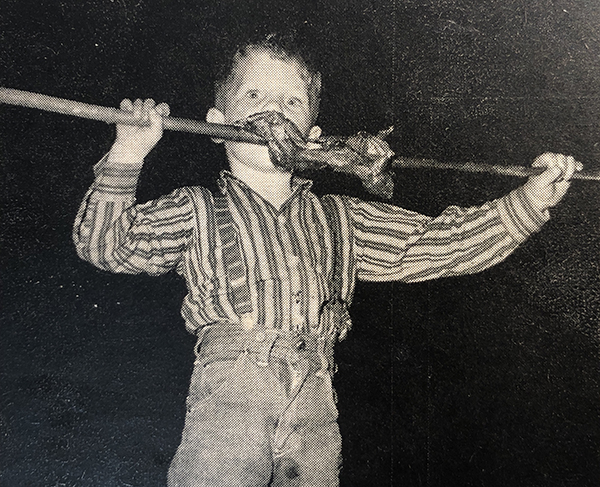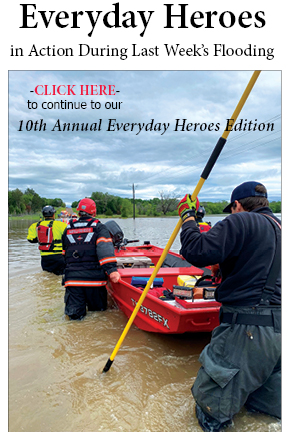
GIVEN ONLY TEN MINUTES TO PACK for their sudden survival camping experiment, the Tinsley family ended up in the woods for two weeks without a lot of presumed “necessities”. Those included eating utensils, and many others. But when you’re hungry, you make do, as four-year-old Reed Tinsley illustrated as he ate squirrel right off the makeshift spit over the campfire. (Tinsley contributed photo)
by John Jefferson
Russell Tinsley was a journalism student in the ‘50s. The Austin American- Statesman hired him to write about the outdoors.
Tinsley had grown up hunting and fishing around rural Mason, Texas. An outdoor writer’s work often takes place off the pavement, so, he was a natural for the job. ‘Sides that, a recent graduate would work for less money.
His writing was “melting butter-smooth”. Interspersed with enough “Hemingway-short sentences” to keep it moving smoothly. He was also deadline oriented. A good hire. He became their first outdoor editor.
One night, as Russell and wife, Marjorie, four-year son, Reed, and new baby, Cynthia, were in the living room, someone knocked on the door.
The man introduced himself as representing Popular Mechanics magazine – a successful do-it-yourself publication at the time. He had an article for Russ to write if he was interested. Tinsley invited him in. If they had been watching “The Twilight Zone”, it couldn’t have been more surreal.
The Cold War was at its peak. Khrushchev had bragged that he would bury us. Times were tense. The man wanted Russ, his wife, and family to pretend a bomb had just been dropped and they had to leave town rapidly, camp out somewhere else for two weeks, and write about it. Marjorie probably checked the calendar to see if it was April 1. They had prankful friends.
But it was for real. And for real money. They were allowed time to make arrangements for the baby. Popular Mechanics had already obtained the Statesman’s approval. They were given 10-minutes THAT EVENING to pack their car for the two-week campout. They could only go as far as the gas in their car right then. Three-quarters of a tank would get them to Mason.
Marjorie grabbed bedding, canned food, a serving spoon, cooking pot, and rubbing alcohol. Russ packed sleeping bags, hardware, fishing gear, a .22 rifle, and bullets. Two weeks later, they left.
They camped in a spot familiar to Russ where Honey Creek enters the Llano River. Onions grew wild, there. That would help.
They were hot, cold, wet, sunburned, tick-bitten, hungry, and depressed, at times. They lost weight. A large fish jerked the stringer out of Russ’s hand, escaping. Coons ate catfish off their lines. Their dog ate a pot of rabbit stew. They endured by working together – surviving on squirrels, rabbits, fish, wild onions, watercress, pecans – and prayer. Never giving up. Russell credited Boy Scout training, but wished he’d packed an axe and a shovel.
Popular Mechanics and the Statesman both published his article. He held the outdoor editor’s job for 27 years before he resigned. His resume included 11 books authored and numerous awards, especially the Outdoors Writers Assn. of America’s top award for the survival articles.
His conclusion to the article read, “I believe the outdoorsman stands the best chance of survival… Should worse come to worse, I plan to be prepared… I’m going into the woods with the idea of coming out alive, coming back to start anew.”
JJ




